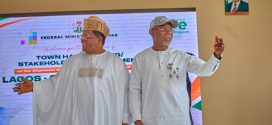Fellow Nigerians, please permit me to borrow the cliché that “whatever has a beginning must have an end.” This is the only way I can describe what seems to be an end to Mallam Sanusi Lamido Sanusi’s reign of recklessness and authoritarianism at the Central Bank of Nigeria. Even if he remains in office till 2014 when his tenure mandatorily expires, he has already waltzed his way into a cul-de-sac. The reason is very simple. Sanusi appears to be a poor student of Nigerian history; otherwise, he would have known that whenever Nigerians are hailing the disciplinarian father of a recalcitrant child, the same people always turn around to ask if he wants to kill his own baby. The attention span of an average Nigerian is short and limited. Nigerians are a people perpetually in search of new heroes. We are a people so confused about what we want, whether democracy or militocracy. Many years of debilitating military interventions and interregnum have turned us into victims of acute psychological impairment.
That must be the reason many of us often deify those we believe can help us punish, or even kill, our enemies. But our romance with kill-and-go administrations is always short-lived. A good example was when the Shehu Shagari government was terminated in 1983 by Mohammadu Buhari and Babatunde Idiagbon, Nigerians spilled into the streets like locusts to celebrate their victory over a most profligate ruling party known then as the National Party of Nigeria. Many prominent members of NPN were hounded into prison, house arrest and exile. Jubilant Nigerians even saw nothing wrong with the despicable attempt to crate Alhaji Umaru Dikko alive and the abortive “mission impossible” to smuggle him back to Nigeria. We tend to love and promote selective justice and injustice. We support whichever is more convenient at any particular time.
The same Nigerians flooded the streets when the man with the toothy smile, Ibrahim Badamasi Babangida did his own coup and sent Buhari and Idiagbon into premature retirement. Yet Babangida did the exact opposite of what Buhari did by giving a human face to dictatorship and inviting prominent Nigerians to serve in his government. He garnished his solid team with a few social critics and freed the Buhari captives from arbitrary incarceration. Babangida did not end it there, he forced open the dreaded cells of the then National Security Organisation where political detainees were tied down and lived like animals. Sympathetic Nigerians thanked the new benevolent ruler and embraced him warts and all. Buhari and Idiagbon simply melted into oblivion.
Sooner than later, Babangada started his transition games and started dribbling Nigerians with the dexterity and foxiness of the legendary Maradona and his infamous ‘hand of God’. He shifted the goal posts several times while the game was on. He even transfigured, without the benefit of elections or any referendum, into a civilian President and held the whole nation spellbound. He banned and unbanned potential candidates at will in a classic case of chess whilst keeping a straight poker face all the time. Nigerians watched in utter amazement, helplessness and befuddlement as someone played them like Ping-Pong. Meanwhile, it was alleged that under Babangida, corruption stank to high heavens. The chief critic at the time was General Olusegun Matthew Okikiola Aremu Obasanjo who called IBB all manner of unprintable names.
To cut a bad story short, an election was conducted on June 12, 1993, and the presidency was won by Chief Moshood Abiola but was annulled by General Babangida for reasons yet to be disclosed till this day. In the middle of this higgledy-piggledy, a contraption called the Interim National Government was hurriedly packaged and Chief Ernest ‘Degunle Shonekan was made its Head. That government lasted only a few months when the maximum ruler with dark goggles, General Sani Abacha arrived on the scene and sacked the ING with automatic alacrity, and everyone scampered into safety without as much as a whimper.
If IBB loved to smile like a beautiful bride, Abacha was the exact opposite as a gloomy groom. His mien was something else and everyone feared him with utter trepidation. He took over the liability of June 12 and appropriated the mandate to himself. Those who challenged him soon found their ways into prisons or on the road to Golgotha. Two of Nigeria’s most powerful army Generals of all times, General Obasanjo and Major General Shehu Musa Yar’Adua who tried to monkey with Abacha were both roasted like chicken in Abacha’s gulag. While Obasanjo was lucky to stay alive and live to tell the tale, Yar’Adua was very unfortunate, as he died in prison and was silenced forever. The winner of the election MKO Abiola and his wife Kudirat died under different circumstances. Other pro-democracy activists suffered various collateral damages, including death.
Is it not strange that the powers-that-be in their wisdom sooner than later thought it fit to invite General Obasanjo to take over the mandate that should have been that of Abiola? The man who made it all happen was Babangida who had been publicly scandalised many times by the same Obasanjo. It is also interesting that Obasanjo would later block the same Babangida who helped him back to power when the man wanted to stage a comeback. The drama also became a theatre of the absurd when General Mohammed Buhari also came back on the scene after quitting power since 1985. He’s been contesting permanently since 2003 and he’s yet to give up. The same Nigerians who called him the wicked tyrant are the same people saying he’s the best man for the task of changing Nigeria for the better no matter how old and weak he may have become since leaving power 27 years ago.
This is my summary of Nigeria’s history that Sanusi failed to read or possibly chose to ignore. A good student of Nigerian history would always try to check when the market is over and the traders must close shop and go home. Sanusi did not understand this and behaved as if he was the de facto President of Nigerian. He had cashed in on the weakness of the Jonathan administration to run his own parallel government and haul insults at anyone who dared to challenge him. He neither spared the executive nor the legislative arms of government. He went meandering from one controversial policy to the other and bullied everyone into submission. If he didn’t know other things, he understood the magnitude of our docility and took full advantage of it. It was always obvious to discerning minds that Sanusi is a man of tall ambitions who was willing to do anything to achieve his aims and goals. He spent money on outlandish projects and anything that caught his fancy and ran a personal fiefdom.
I must confess that when Mallam Sanusi started his highly-controversial tenure at CBN, on June 4, 2009, I saw through the smokescreen of his vengeful mission very early in the day, and warned many of those jumping up like frogs thinking a Messiah had finally landed on our shores to take caution. While acknowledging his academic brilliance, I was duly worried about his unbridled radicalism. He did everything in the extreme and lacked the tolerance to persuade others. In the process, he stepped on too many toes and acted like he was beyond control. He fought for total autonomy for the CBN and campaigned vociferously against any form of audit by anyone of his actions as CBN Governor. He thus became a loose cannon and a sword of Damocles against his foes. His word was law as everyone feared his tempestuous outbursts.
You must give it to him, Sanusi is a princely and charming man. He’s the type that most ladies would see and curtsey. He loves attention and attracts it almost effortlessly. He would have done so well as a Nollywood actor or a music superstar. It is strange how a man of such sartorial tastes ended up in banking and not showbiz. The profession he chose was traditionally reserved for taciturn and conservative characters and not for vainglorious and adventurous rabble-rousers. His major weakness was his sharp tongue. He could almost raise the dead with it.
Sanusi had managed to capitalise on the kill-and-go mentality of most Nigerians to win sympathy for his dangerous annihilation of his enemies without caring for the stray bullets that may hit innocent bystanders. In other to catch a few rats, Sanusi chose to set fire to the whole village. He needed to disguise his real intentions and motives by taking on an entire institution and sacking otherwise brilliant bankers in the process. Some innocent people had their eventful careers terminated by a rampaging bull that was goaded on by a neurotic society and a vindictive population. It was so tragic that the warnings of a few of us fell on the deaf ears of those who were more interested in the extra-judicial crucifixion of those perceived as rogue bankers. Nigerians allowed themselves to be mesmerised and hypnotised and hoodwinked by a quintessential bully in search of victims to devour.
Sanusi’s eloquence and debonair presence made it possible for many of his unwary admirers to get carried away by his sophistry. But they didn’t need to look too far to realise that his combative approach would soon go up in smoke like others before him. Perhaps, he would have fared better as a military dictator than as a sanitary inspector in the cesspool of banking mess. The game he played was too hot to handle and for too long. He should have known that one way or the other anyway, the chicken must come home to roost. And bullies always have their terminal dates. This is because, according to Wikipedia, “a bully is a constant harasser of the weak.” A bully argues his victims into submission through intimidation and name calling.
Wikipedia explains further that a bully is usually arrogant and narcissistic and by bullying others, he feels empowered. He suffers from “personality disorders, quickness to anger, use of force, addiction to aggressive behaviours, engaging in obsessive or rigid actions…well-planned and orchestrated attempts at character-assassination…” It explains that a bully cannot exist or thrive without the active connivance “of a large group of relatively uninvolved bystanders.” It is the ability of the bully to create the illusion of a support base from the majority that propels him to instil the fear of God into people and prevent them from speaking out against him. This is palpable in Sanusi’s case as no member of the economic team or the Institute of Bankers could openly speak up against the excesses of this man. Even our President appeared to have been clearly subdued; the reason he quickly assented to a foolish experiment. Bullies exert and expand their power when they see the unwillingness of anyone to challenging or taking them on because they depend largely on mob action.
Wikipedia puts it succinctly: “When the bully encounters no negative response from observers, it provides social approval for the bullying and encourages continuation of the behaviour.” Most people ignore bullies because they are not in any present danger themselves, or may feel that there’s no point becoming the next victim, so better to keep mute. But there is never a guarantee that anyone can escape the bully, as General Obasanjo must have discovered when Sanusi referred to him as “a poor economist.”
I believe three things ended Sanusi’s regime of fear. The first is that he did not gauge the mood of his ubiquitous mob who did not subscribe to his N5,000 note misadventure. If he read their lips, he would have known he was on his own and would have avoided the risk of dancing naked in the market place. And the second was his attempt to stylishly rubbish a former President and Commander-in-Chief, Olusegun Obasanjo. No matter the degree of the seeming cold war between Obasanjo and his estranged godson, President Goodluck Jonathan, no one would allow Sanusi get away with such sauciness while he’s still a public servant.
The last straw is the rumour of Sanusi’s Presidential ambition which he has since denied. But denial or not, the Jonathan crew would never close their two eyes again where Sanusi is concerned, and he has become a potential enemy and a marked man whose wings must be clipped.
He should have realised that a child who buys a pair of shoes for his limping father must be ready to listen to the dark tales of his lineage.
By his own feathers, Sanusi is now smitten! That is how the cookies always crumble
Dele Momodu contributed this piece for Thisday
 Hottestgistnaija.com
Hottestgistnaija.com





This is a concise epitomy of Nigeria history and a sound warning to Sanusi. One day monkey will go market and wont return. Oro lo so joor Dele Momodu